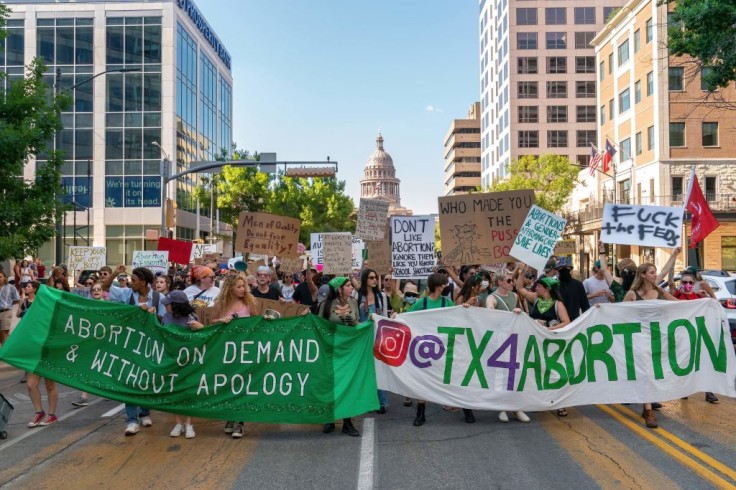
The state of Texas finds itself at the center of a heated legal battle as four plaintiffs began their emotional testimonies on the first day of hearings.
In a lawsuit challenging the state's abortion bans, the women asserted that their lives were endangered due to the restrictive laws. This landmark case, filed by the Center for Reproductive Rights, has garnered national attention as the plaintiffs seek a preliminary injunction to allow for lifesaving abortions.
Among those testifying were Samantha Casiano and Ashley Brandt, who shared their heartbreaking experiences of facing life-threatening complications during their pregnancies.
Texas Abortion Ban Risked Samantha Casiano's Life
According to NBC News, Samantha Casiano's testimony reverberated through the courtroom as she recounted her heart-wrenching journey through a high-risk pregnancy.
At 20 weeks' gestation, Casiano learned that her baby suffered from anencephaly, a condition where parts of the brain and skull were missing. Her obstetrician informed her that the baby would not survive after birth, and she was even given information about funeral homes.
Casiano recounted that she was compelled to proceed with a nonviable pregnancy until her baby tragically passed away a mere four hours after childbirth. The distressing news came to light during an ultrasound appointment she attended alone. Following the diagnosis, Casiano met with her obstetrician, who did not present abortion care as an option.
Despite considering seeking abortion care elsewhere, logistical challenges, including car troubles and caring for her other children, prevented her from doing so, and fear of potential consequences deterred her from seeking assistance for travel.
On the stand, Casiano read a doctor's note diagnosing her pregnancy as high risk. The emotional weight of the situation overwhelmed her, and she broke down, prompting the judge to call for a recess.
After the hearing resumed, Casiano explained that certain events triggered physical reactions due to the trauma she endured during her pregnancy.
Casiano is part of a group of 13 women and two OB-GYNs who are suing the state of Texas. Their lawsuit, filed in March by the Center for Reproductive Rights, seeks clarity on the types of situations that constitute a medical emergency under Texas' abortion laws.
Ashley Brandt's Journey to Another State for Abortion Care
During her testimony, Ashley Brandt revealed that she had to leave Texas to seek abortion care after one of the twins she was carrying was diagnosed with a devastating and fatal condition known as acrania.
As per ABC, this condition left the baby's brain and tissue exposed to the amniotic fluid as the skull had not fused properly. To give the other twin the best chance at survival, Brandt underwent a selective fetal reduction procedure in Denver, where one of the pregnancies was aborted.
Brandt explained that she was advised to stay in Colorado for two weeks following the procedure, but due to logistical constraints, she and her partner returned to Texas just one day later.
Upon their return, she experienced some bleeding, but she hesitated to seek hospital care initially because the procedure she had received was illegal in Texas. Fear of getting herself or others into trouble prevented her from seeking immediate medical attention, but she eventually sought the necessary care.
She tearfully recounted that had she opted for the legal options available in Texas, her daughter, Marley, would likely have been born prematurely and faced severe health challenges. Brandt would have had to witness the progressive deterioration of one twin during each ultrasound until delivery, facing the heartbreak of giving birth to a baby without a skull or a brain and holding her until her passing.
Brandt expressed deep gratitude that she was able to give birth to her healthy daughter, Marley, thanks to the care she received in Colorado. However, the experience left her with lingering fears about future pregnancies in Texas.
Read Also: New Mexico Child Abuse Case: Two Women Sentenced to Prison for Starving, Chaining Children
Legal Battle for Reproductive Rights Continues
The Texas Tribune reported that the two-day hearing, which commenced on Wednesday, focuses on the plaintiffs' request for a temporary injunction to block Texas' abortion bans from applying to high-risk pregnancies.
On the other side, the state of Texas has requested the dismissal of the lawsuit, claiming that the suit is merely rooted in the plaintiffs' dissatisfaction with medical care received and their opposition to Texas' laws.
During the press conference following the hearing, Molly Duane, a senior staff attorney at the Center for Reproductive Rights and lead attorney on the case, emphasized the significance of this legal battle. She revealed that this is the first time women who were denied abortions have testified against a state since the landmark Supreme Court case, Roe v. Wade, in the 1970s.
Passionately asserting that tens of thousands of Texans have faced abortion denials, Duane emphasized that Texas is currently grappling with a healthcare crisis. The central concern of the case, she pointed out, is determining who should be eligible for abortions under the medical exception to the ban, which remains unresolved even two years later.
As the testimonies unfolded, all three women who testified broke down, reliving the traumatic experiences they faced during their nonviable pregnancies. The presiding Judge Jessica Mangrum will soon issue decisions on both the motions.
This case has garnered widespread attention as it marks the first instance where women who were denied abortions have sued a state since the Supreme Court overturned Roe v. Wade.
As the legal battle continues, it remains to be seen how this emotionally charged case will impact abortion laws not only in Texas but also potentially setting new precedents for other states grappling with similar restrictions.